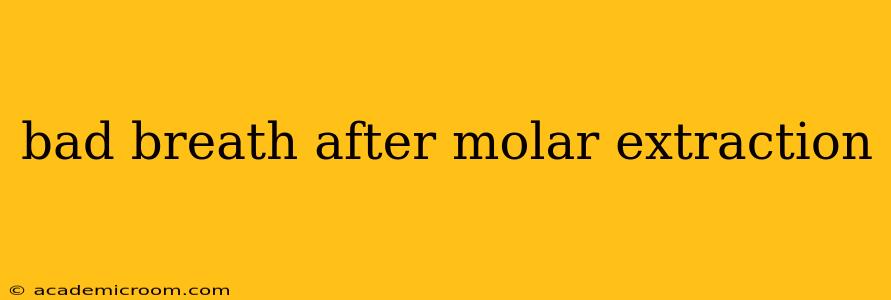Bad breath, or halitosis, is a common concern after any oral surgery, including molar extraction. While it's often temporary, understanding its causes and how to manage it can significantly improve your post-operative comfort and recovery. This comprehensive guide explores the reasons behind post-extraction halitosis, offers effective solutions, and answers frequently asked questions.
Why Do I Have Bad Breath After a Molar Extraction?
Several factors contribute to bad breath following molar extraction. The most significant is the presence of blood clots and debris in the extraction site. This provides a breeding ground for bacteria, leading to an unpleasant odor. The healing process itself involves inflammation and tissue breakdown, which can also release odor-causing compounds.
Furthermore, difficulty in maintaining proper oral hygiene in the immediate post-operative period can exacerbate the problem. The discomfort and swelling often make thorough brushing and flossing challenging, allowing bacteria to accumulate. Finally, certain medications prescribed for pain relief or infection prevention can occasionally contribute to dry mouth (xerostomia), a known contributor to bad breath.
How Long Does Bad Breath Last After a Molar Extraction?
The duration of bad breath after a molar extraction varies depending on individual healing rates and adherence to post-operative instructions. Typically, it subsides within a week or two, as the extraction site heals and proper oral hygiene is re-established. However, persistent bad breath beyond two weeks warrants a follow-up visit with your dentist or oral surgeon to rule out any complications, such as dry socket (alveolar osteitis).
How Can I Get Rid of Bad Breath After a Molar Extraction?
Managing post-extraction bad breath involves a combination of strategies:
-
Gentle Rinsing: Begin rinsing gently with a saltwater solution (1/2 teaspoon of salt dissolved in 8 ounces of warm water) several times a day. This helps to clean the extraction site, reduce inflammation, and keep the area free of debris. Avoid vigorous rinsing, which can dislodge the blood clot.
-
Oral Hygiene: As soon as your dentist or oral surgeon advises, resume gentle brushing and flossing, taking extra care to avoid the extraction site. Use a soft-bristled toothbrush and floss gently around the affected area, avoiding direct contact with the wound.
-
Hydration: Drink plenty of water throughout the day. Staying well-hydrated helps to stimulate saliva production, which naturally helps to neutralize bacteria and keep your mouth moist.
-
Avoid Smoking and Alcohol: Smoking and alcohol can interfere with the healing process and exacerbate bad breath. Strictly avoid both during your recovery.
-
Dietary Changes: Certain foods can contribute to bad breath. While recovering, consider limiting strong-smelling foods like onions and garlic.
What If My Bad Breath Persists After a Molar Extraction?
Persistent bad breath (lasting longer than two weeks) could indicate a problem, such as:
-
Dry Socket: This painful condition occurs when the blood clot in the extraction site becomes dislodged or dissolves prematurely. It's a significant source of bad breath and requires immediate dental attention.
-
Infection: An infection at the extraction site can also lead to persistent bad breath, along with other symptoms like swelling, pain, and fever.
-
Underlying Medical Condition: In rare cases, persistent bad breath may signal an underlying medical condition unrelated to the extraction.
If you experience persistent bad breath, swelling, increased pain, or any other concerning symptoms, contact your dentist or oral surgeon immediately.
Can I Use Mouthwash After a Molar Extraction?
The use of mouthwash after molar extraction is generally discouraged in the immediate post-operative period, as some mouthwashes contain alcohol that can irritate the sensitive extraction site and impede healing. If you’re unsure, it is always best to consult your dentist or oral surgeon for personalized advice. They may recommend a specific type of mouthwash for use after the initial healing phase.
Is Bad Breath After Molar Extraction Normal?
Yes, some degree of bad breath is generally considered normal in the immediate days following a molar extraction due to the healing process and the presence of blood clots and debris. However, if the bad breath is severe, persistent, or accompanied by other symptoms, it's crucial to seek professional dental care. Regular follow-up appointments with your dentist are vital for monitoring the healing process and addressing any potential complications.
